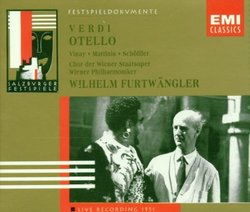| All Artists: Giuseppe Verdi, Wilhelm Furtwangler, Franz Bierbach, Anton Dermota, Josef Greindl, August Jaresch, Ramón Vinay Title: Verdi: Otello Members Wishing: 0 Total Copies: 0 Label: EMI Classics Release Date: 10/17/2000 Album Type: Import Genre: Classical Styles: Opera & Classical Vocal, Historical Periods, Modern, 20th, & 21st Century Number of Discs: 2 SwapaCD Credits: 2 UPC: 724356575127 |
Search - Giuseppe Verdi, Wilhelm Furtwangler, Franz Bierbach :: Verdi: Otello
 | Giuseppe Verdi, Wilhelm Furtwangler, Franz Bierbach Verdi: Otello Genre: Classical
|
Larger Image |
CD Details |
CD ReviewsFurtwangler's Only Verdi Opera Recording Jeffrey Lipscomb | Sacramento, CA United States | 06/22/2005 (3 out of 5 stars) "As a long-standing admirer of the great German conductor Wilhelm Furtwangler (1886-1954), I regret to say that the extremely poor recorded sound of this EMI set will limit its appeal mostly to die-hard Furtwangler fans. That's a shame, for this is Furtwangler's only Verdi opera recording, and his leadership here is truly outstanding. This Salzburg production was staged in 1951 to honor the fiftieth anniversary of Verdi's death. As Furtwangler presents it, Otello is very much a conductor's work. In his hands, the score has terrific weight and tension. It's a fascinating contrast to Toscanini's more mercurial interpretation (the Italian maestro's opening storm sequence remains unmatched for pure volcanic fury). Sadly, in addition to its poor sound, Furtwangler's performance is handicapped by a less than ideal cast. As the excellent appraisal here by reviewer Cantrell suggests, Dragica Martins is a barely adequate Desdemona, and Paul Schoeffler's Iago is excessively Germanic. This is one of three complete Otellos that captures the fine artistry of Chilean tenor Ramon Vinay who, like Carlo Bergonzi and Placido Domingo, started his career as a baritone and later "moved up." Vinay assumed the title role under Toscanini and also starred in a "live" Met production from 1949 under Fritz Busch (my version of the latter is on the original Penzance LPs; its conducting is closer in style to Toscanini's). Vinay is a powerfully moving Otello (best-sung with Busch), and his portrayal for me ranks with those by Martinelli (a "live" 1938 Met production currently unavailable on CD) and Vickers (the RCA stereo studio set conducted by Serafin) as the finest ever recorded. The Busch set has Leonard Warren's opulently-sung Iago, while Tito Gobbi's (under Serafin) is a brilliantly-acted study in sheer malevolence. In their different ways, the Desdemonas of Licia Albanese (Busch) and Leonie Rysanek (Serafin) are both wonderfully sympathetic. For Furtwangler's magisterial conducting, this set is of great value. But for general listeners, I think that the RCA stereo set, with Serafin's stately but never plodding conducting, a fine cast, and superb recorded sound is the best over-all choice. Hopefully the fine Busch set will re-surface on CD - its faster conducting is on an equal plane with Furtwangler's. Recommended primarily to Furtwangler admirers. Jeff Lipscomb " Furtwängler, Vinay and Dermota in dimly recorded "Otello" L. E. Cantrell | Vancouver, British Columbia Canada | 06/17/2005 (3 out of 5 stars) "The great Wilhelm Furtwängler ventured into the territory of Arturo Toscanini, his only rival among Twentieth Century conductors, with this recording of "Otello."
This is a live performance from the post-War revival of the Salzburg Festival, which owes its success, and even its survival, to Furtwängler. In addition to the conductor, it showcases two great performers, Ramon Vinay as Otello and Anton Dermota in the supporting role of Cassio. The other two main principal singers are less inspired. Dragica Martinis was all right as Desdemona, but no more. Paul Schöffler was a fine performer but the villainy of his Iago is ultimately Germanic in nature, ill-fitting to Verdi's character and without a full-bodied, Italianate bite. The rest of the cast was good but not truly at home in Italian opera. Both Toscanini and Furtwängler used Ramon Vinay for their respective Otellos. He was a splendid choice for both, a baritone who for a few years moved up to take on Tristan, Siegmund and Otello before dropping down once again to take on the likes of Scarpia. He was a moving vocal actor. Among all heroic tenors, only Jon Vickers could hope to match him in creating moving portraits of the operatic Men of Sorrow. Vinay is impressive for both the mighty conductors, but had become more experienced and perhaps a hair better for Furtwängler. The brilliant work of the conductor and his two superb tenors is tragically undermined by recorded sound of this "Otello," which at best must be described as dim and mediocre. It certainly does not compare with the far better sound of the even older Toscanini "Otello." Like certain other formally approved performances from the Salzburg Festival, this recording combines atrocious sound reproduction with outrageous pricing. This "Otello" is for the serious collector who is willing to mine for the gold of Vinay, Dermota and Furtwängler amid sonic dross. " |

 Track Listings (20) - Disc #1
Track Listings (20) - Disc #1